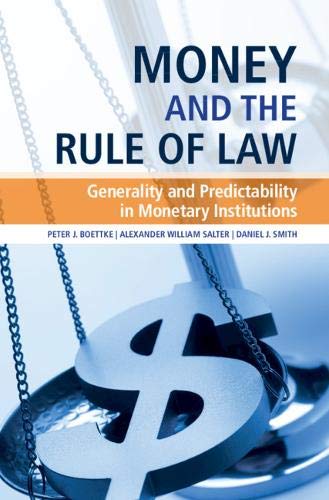Knowledge Problems With Discretionary Central Banking

Monetary policy under a discretionary central bank is ineffective and unlawful. It is ineffective because it does not accomplish its intended goal, which is macroeconomic stability. It is unlawful because it is inconsistent with the basic jurisprudential norms of a liberal democracy. In a new book, Pete Boettke, Dan Smith, and I discuss the sources of these problems.
Perhaps the most important, and most overlooked, difficulty with discretionary monetary policy is the knowledge problem. In brief, central bankers do not and cannot have the knowledge necessary to create macroeconomic stability. The problem monetary policymakers face is of a kind with the problem faced by a central planner. In the early and mid-20th century, Mises and Hayek correctly argued that without property rights, prices, and profit, society-wide economic activity cannot be coordinated. This is why central planning fails: it destroys the very knowledge source that allows for economic efficiency in markets. Discretionary monetary policy is also a central planning problem, albeit of a different kind.
What does good monetary policy look like? In brief, good monetary policy matches the supply of money with the demand to hold it, at the going price level. It enables market prices to do a good job conveying information about relative resource scarcities and thereby promotes widespread specialization and exchange.
When monetary policy is not conducted well, market actors face signal-extraction problems. They can’t tell whether the observed prices, and hence profits or losses, are due to real or nominal (monetary) factors. They might over- or under-produce as a result.
Can discretionary central banking maintain monetary equilibrium? The answer is no. Central bankers lack access to a real-time feedback process that conveys the state of the money market.
Whether there is currently an excess demand for, or supply of, money, and how much, matters greatly for optimal policy. But this is the kind of information that cannot be harnessed in top-down fashion. It can only be generated bottom-up. Since money is one-half of all exchanges, planning the money market is an incomprehensibly difficult task. No matter how well-trained they are as economists, monetary policymakers will err as a matter of course, teetering the economy away from monetary equilibrium, and hence the economy’s full-employment level of output.
In addition to the knowledge problem, there are a host of lesser information problems associated with monetary policy. While not fatal, they are difficult enough that we have every right to doubt discretionary central banking will work well.
First, discretionary monetary policy requires central bankers to have a good working model of the economy, with special reference to the transmission mechanisms of policy. It hardly needs to be said that we haven’t got one. Economists have been trying to macro-engineer the economy for decades, and frankly we’re no closer now than we were during the Great Moderation.
Second, almost by definition, there is no clear agreement among policymakers about the objective of monetary policy. Some focus on narrow monetary considerations; others include broader financial-sector concerns; still others want to include inequality and climate change. This is hardly conducive to coherent policy decisions.
Third, we still do not have a good understanding of the available instruments of monetary policy. By ‘instruments,’ we mean the means of implementing policy. Failure even by elite economists to understand instruments is evident by their insistence that the federal funds rate is an instrument. It isn’t. It’s instead a target: something used as a barometer of policy, not a means of implementing policy. If the most credentialed macroeconomists in the world can’t distinguish an instrument from a target, what hope is there for discretionary policy?
In conclusion, discretionary monetary policy confronts an enormous epistemic burden. The knowledge problem is the ultimate hurdle. But the lesser information problems matter, too. You need to make some truly heroic assumptions in order for discretionary monetary policy to outperform rule-bound policy. Rarely do any of those assumptions hold. Never do they all hold. If we want a well-functioning central bank, the best we can do is to have rules.










